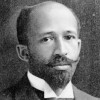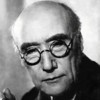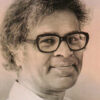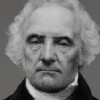Our Father in Heaven, not by Heaven bounded
but there indwelling for the greater love Thou
bear’st Thy first works in the realm first-founded,
hallowed be Thy name, hallowed Thy Power
by every creature as its nature grants it
to praise Thy quickening breath in its brief hour.
Let come to us the sweet peace of Thy reign,
for if it come not we cannot ourselves
attain to it however much we strain.
And as Thine Angels kneeling at the throne
offer their wills to Thee, singing Hosannah,
so teach all men to offer up their own.
Give us this day Thy manna, Lord we pray,
for if he have it not, though man most strive
through these harsh wastes, his speed is his delay.
As we forgive our trespassers the ill
we have endured, do Thou forgive, not weighing
our merits, but the mercy of Thy will.
Our strength is as a reed bent to the ground:
do not Thou test us with the Adversary,
but deliver us from him who sets us round.
This last petition. Lord, with grateful mind,
we pray not for ourselves who have no need,
but for the souls of those we left behind.[O Padre nostro, che ne’ cieli stai,
non circunscritto, ma per più amore
ch’ai primi effetti di là sù tu hai,
laudato sia ’l tuo nome e ’l tuo valore
da ogne creatura, com’è degno
di render grazie al tuo dolce vapore.
Vegna ver’ noi la pace del tuo regno,
ché noi ad essa non potem da noi,
s’ella non vien, con tutto nostro ingegno.
Come del suo voler li angeli tuoi
fan sacrificio a te, cantando osanna,
così facciano li uomini de’ suoi.
Dà oggi a noi la cotidiana manna,
sanza la qual per questo aspro diserto
a retro va chi più di gir s’affanna.
E come noi lo mal ch’avem sofferto
perdoniamo a ciascuno, e tu perdona
benigno, e non guardar lo nostro merto.
Nostra virtù che di legger s’adona,
non spermentar con l’antico avversaro,
ma libera da lui che sì la sprona.
Quest’ultima preghiera, segnor caro,
già non si fa per noi, ché non bisogna,
ma per color che dietro a noi restaro.]Dante Alighieri (1265-1321) Italian poet
The Divine Comedy [Divina Commedia], Book 2 “Purgatorio,” Canto 11, l. 1ff (11.1-24) (1314) [tr. Ciardi (1961)]
(Source)
A paraphrase of the Christian Paternoster (the Lord's Prayer or "Our Father," from Matt. 6.9-13) prayer, recited by the Proud in Purgatory as both a "first children's prayer" and an act of humility. While it may seem blasphemous for Dante to modify a Biblical prayer in this way, St. Augustine wrote that the Lord's Prayer could be personalized, so long as its main petitions remained intact.
Given the length of the passage, I've reduced the number of parallel translations shown.
(Source (Italian)). Alternate translations:
Great Father! whom the Universe obeys!
Who, by thy boundless Love's transcendent rays.
In purest light, the brightest virtue flows:
Let all the orders of creation join
In one deep plaudit to that love divine.
Which thro' the countless tribes of being glows.
Let thy celestial Grace, with heav'nly plume,
Descend, where, plung'd in this terrestrial gloom,
We ply our powers in vain, to seize the boon;
And as the Powers above, that own thy sway,
With joy the dictates of thy will obey.
So may th' example spread beneath the Moon.
May thy unsparing hand, with daily food,
Supply our frailty; else, by Time subdu'd,
Our steps must falter in this vale of woe;
As other's faults we pass, do thou forgive! --
Let not our deep defects our souls deprive
Of thy supernal favours, bounteous flow!
With thy protecting hand, O Saviour! shield
Our stagg'ring virtue, in the dangerous field!
And keep at bay the sin-provoking Foe.
We pray not for ourselves, but those behind.
That, breathing still, their painful journey wind
Thro' the sublunar vale of crimes and woe.
[tr. Boyd (1802), st. 1-4]
Our Father, thou who dwellest in the heavens,
Not circumscribed, but from the greater love
Thou bearest to the first effects on high,
Praised be thy name and thine omnipotence
By every creature, as befitting is
To render thanks to thy sweet effluence.
Come unto us the peace of thy dominion,
For unto it we cannot of ourselves,
If it come not, with all our intellect.
Even as thine own Angels of their will
Make sacrifice to thee, Hosanna singing,
So may all men make sacrifice of theirs.
Give unto us this day our daily manna,
Withouten which in this rough wilderness
Backward goes he who toils most to advance.
And even as we the trespass we have suffered
Pardon in one another, pardon thou
Benignly, and regard not our desert.
Our virtue, which is easily o'ercome,
Put not to proof with the old Adversary,
But thou from him who spurs it so, deliver.
This last petition verily, dear Lord,
Not for ourselves is made, who need it not,
But for their sake who have remained behind us.
[tr. Longfellow (1867)]
Our Father, who in the heavens abidest, not as circumscribed, but through the greater love which Thou hast to Thy first effects on high, praised be Thy name and Thy worth by every creature, as it is meet to render thanks to Thy sweet Spirit. Let the peace of Thy kingdom come to us, for we towards it can naught of ourselves, if it comes not, with all our wit As of their will Thy angels make sacrifice to Thee, chanting Hosanna, so may men do of theirs. Give this day to us the daily manna, without which through this rough desert backward he goes who most toils to go forward. And as we forgive to each man the evil which we have suffered, do Thou also graciously forgive, and not regard our merit. Our strength, which easily surrenders, put not Thou to proof with the old adversary, but deliver it from him, who so urges it This last prayer, dear Lord, no longer is made for us, for it needs not, but for those who have remained behind us.
[tr. Butler (1885)]
Our Father who dost dwell in Heaven above,
Not circumscribed, but that Thou there dost place
Upon Thy primal effluence, higher love,
For ever hallowed be Thy Name and grace,
By each created thing, as is most right
In rendering thanks Thy savour to embrace.
The peace of Thy own kingdom on us light,
Which of ourselves we never could attain.
Unless it come through striving with all might.
As, by their own desire, Thy angels fain
Singing Hosanna, sacrifice to Thee,
So may Thy will be done on earth by man.
Provide us with our daily manna free,
Without the which, this desert road along.
He would go back, who striveth most to flee.
And as we pardon unto each the wrong
Which we have suffered, be our pardoner,
Nor weigh the merits which to us belong.
Our virtue, which so easily doth err,
Do not thou test it with the ancient foe,
Deliver us from him that so doth spur.
This last petition, O dear Lord, we owe
Not for ourselves, for whom is no more need,
Rather for those we've left behind below.
[tr. Minchin (1885)]
O our Father, who art in heaven above,
Not as being circumscribed, but because toward
Thy first creation thou hast greater love,
Hallowed thy name be and thy power adored
By every creature, as is meet and right
To give thanks for the sweetness from thee poured;
May upon us thy kingdom's peace alight.
For to it of ourselves we cannot rise,
Unless it come itself, with all our wit.
As of their will thine angels' companies
Make sacrifice, as they Hosanna sing,
So may men make of their will sacrifice.
To us this day our daily manna bring:
Else through this desert harsh must he revert
His steps, who most to advance is labouring.
And as we pardon every one the hurt
That we have suffered, do thou pardon too,
Begninant, nor remember our desert.
Try not our will, so easy to subdue,
With the old adversary, and by thine aid
Save us from him who goads it, to our rue.
This last prayer, dear Lord, is for us not made
Any more, since remaineth now no need,
But 'tis for those who have behind us stayed.
[tr. Binyon (1943)]
Our Father, dwelling in the Heavens, nowise
As circumscribed, but as the things above,
Thy first effects, are dearest in Thine eyes.
Hallowed Thy name be and the Power thereof,
By every creature, as right meet it is
We praise the tender effluence of Thy Love.
Let come to us, let come Thy Kingdom's peace;
If it come not, we've no power of our own
To come to it, for all our subtleties.
Like as with glad Hosannas as Thy throne
Thine angels offer up their wills away,
So let men offer theirs, that Thine be done.
Our daily manna give to us this day,
Without which he that through this desert wild
Toils most to speed goes backward on his way.
As we, with all our debtors reconciled,
Forgive, do Thou forgive us, nor regard
Our merits, but upon our sins look mild.
Put not our strength, too easily ensnared
And overcome, to proof with the old foe;
But save us from him, for he tries it hard.
This last prayer is not made for us -- we know,
Dear Lord, that it is needless -- but for those
Who still remain behind us we pray so.
[tr. Sayers (1955)]
Our Father Who in Heaven dost abide,
not there constrained but dwelling there because
Thou lovest more Thy lofty first effects,
hallowed by Thy name, hallowed Thy Power,
by Thy creatures as it behooves us all
to render thanks for Thy sweet effluence.
Thy kingdom come to us with all its peace;
if it come not, we of ourselves cannot
attain to it, no matter how we strive.
And as Thine angels offer up their wills
to Thee in sacrifice, singing Hosannah,
let all men offer up to Thee their own.
Give us this day our daily manna, Lord:
without it, those most eager to advance
go backwards through this wild wasteland of ours.
As we forgive our trespassers, do Thou,
forgive our trespasses, merciful Lord,
look not upon our undeserving worth.
Our strength is only weakness, lead us not
into temptation by our ancient foe,
deliver us from him who urges evil.
This last request, beloved Lord, we make
not for ourselves, who know we have no need,
but for those souls who still remain behind.
[tr. Musa (1981)]
Our father, which art in heaven,
Not because circumscribed, but out of the greater love
You have for your first creation on high,
Praise be to your name and worthiness
From every creature, as it is appropriate
To render thanks to your sweet charity.
Thy kingdom come, and the peace of thy kingdom,
Because we cannot attain it of ourselves,
If it does not come, for all our ingenuity.
As of their own freewill your angels
Make sacrifice to you, singing Hosanna,
So may men also do of their freewill.
Give us this day our daily manna,
Without which, through the roughness of this desert,
He who tries hardest to advance, goes backward.
And as we forgive everyone the evil
That we have suffered, may you pardon us
Graciously, and have no regard to our merits.
Do not put our virtue to the test
With the old adversary, it is easily overcome,
But free us from him who spurs us on.
This last prayer, dear Lord, we no longer
Make for ourselves, having no need of it,
But for those who are left behind us.
[tr. Sisson (1981)]
Our Father, You who dwell within the heavens --
but are not circumscribed by them -- out of
Your greater love for Your first works above,
praised be Your name and Your omnipotence,
by every creature, just as it is seemly
to offer thanks to Your sweet effluence.
Your kingdom’s peace come unto us, for if
it does not come, then though we summon all
our force, we cannot reach it of our selves.
Just as Your angels, as they sing Hosanna,
offer their wills to You as sacrifice,
so may men offer up their wills to You.
Give unto us this day the daily manna
without which he who labors most to move
ahead through this harsh wilderness falls back.
Even as we forgive all who have done
us injury, may You, benevolent,
forgive, and do not judge us by our worth.
Try not our strength, so easily subdued,
against the ancient foe, but set it free
from him who goads it to perversity.
This last request we now address to You,
dear Lord, not for ourselves -- who have no need --
but for the ones whom we have left behind.
[tr. Mandelbaum (1982)]
O our Father who are in the heavens, not circumscribed, but because of the greater love you bear those first effects up there,
praised be your Name and your Power by every creature, for it is fitting to give thanks to your sweet Spirit.
Let the peace of your kingdom come to us, for we cannot attain to it by ourselves, if it does not come, with all our wit.
As the angels sacrifice their wills to you, singing Hosanna, so let men do with theirs.
Give us this day our daily manna, without which in this harsh wilderness he goes backwards who most strives forward.
And as we forgive all others for the evil we have suffered, do you forgive us lovingly, and do not regard our merit.
Our strength, which is easily subdued, do not tempt with the ancient adversary, but free it from him who spurs it so.
This last prayer, dear Lord, we do not make for ourselves, since there is no need, but for those who have stayed behind.
[tr. Durling (2003)]
O our Father, who are in Heaven, not because of your limitation, but because of the greater love you have for your first sublime works, praised be your name and worth by every creature, as it is fitting to give thanks for your sweet outpourings. May the peace of your kingdom come to us, since we cannot reach it by ourselves, despite all our intellect, if it does not come to us itself. As Angels sacrifice their will to yours, singing Hosanna: so may men sacrifice theirs. Give us this day our daily bread, without which he who labours to advance, goes backward, through this harsh desert. And forgive in loving-kindness, as we forgive everyone, the evil we have suffered, and judge us not by what we deserve. Do not test our virtue, that is easily conquered, against the ancient enemy, but deliver us from him who tempts it. And this last prayer, dear Lord, is not made on our behalf, since we do not need it, but for those we have left behind.
[tr. Kline (2002)]
O our Father, whose place is high in Heaven
Not fixed or held in the sky, but there ascending
Because of Your love for the first of Your creations,
May Your name be praised by every living
Creature, and also Your virtues, for You deserve
Such gratitude for all the emanations
You send us. May your kingdom's peace come down
To us, who are not strong enough by ourselves,
And can not take it, no matter how we strive.
Just as Your angels sacrifice their wills
To You, singing Hosannah, men as well
Should bend their wills to Yours, and sing Hosannah.
Give us, this day, our daily grace, without which
Men go backwards, here in this bitter desert,
Forced to go back, although they struggle for more.
And just as we forgive to all men the wrongs
We have endured, may You in loving kindness
Pardon us, in spite of all our sins.
Our powers are weak, and easily overcome:
Do not oblige us to fight our ancient foe,
But free us from him, who tries to woo us with evil.
And this last prayer, dear Lord, we do not make
For ourselves, who are not in need, but for the sake
Of those behind us, as we rise to Your face.
[tr. Raffel (2010)]
For it’s the will
And not the gift that makes the giver.[Denn der Wille
und nicht die Gabe macht den Geber.]Gotthold Lessing (1729-1781) German playwright, philosopher, dramaturg, writer
Nathan the Wise [Nathan der Weise], Act 1, sc. 5 [Lay Brother/Friar] (1779) [tr. Morgan (1955)]
(Source)
(Source (German)). Alternate translations:
The will, and not the deed, makes up the giver.
[tr. Taylor (1790)]
'Tis
The will, and not the boon, that makes the giver.
[tr. Reich (1860)]
For the will it is
That makes the giver -- not the gift.
[tr. Jacks (1867)]
For the will and not the gift makes the giver.
[Source (1873)]
The will and not the deed perfects the giver.
[tr. Boylan (1878)]
For 'tis the will, and not the gift,
That makes the giver.
[tr. Corbett (1883)]
The will and not the gift
Doth constitute the giver.
[tr. Maxwell (1917)]
Because the intention and not the gift make the giver.
[tr. Reinhardt (1950)]
It's not the gift that makes the giver, no, but rather his good will.
[tr. Ade (1972)]
There is of course a clash between ‘literary’ technique, and the fascination of elaborating in detail an imaginary mythical Age (mythical, not allegorical: my mind does not work allegorically). As a story, I think it is good that there should be a lot of things unexplained (especially if an explanation actually exists); and I have perhaps from this point of view erred in trying to explain too much, and give too much past history. Many readers have, for instance, rather stuck at the Council of Elrond. And even in a mythical Age there must be some enigmas, as there always are. Tom Bombadil is one (intentionally).
J.R.R. Tolkien (1892-1973) English writer, fabulist, philologist, academic [John Ronald Reuel Tolkien]
Letter to Naomi Mitchison (1954-04-25)
(Source)
Letter 144 in Humphrey Carpenter, ed., The Letters of J.R.R. Tolkien (1981).
An evil doom of some god was my undoing, and measureless wine.
[ἆσέ με δαίμονος αἶσα κακὴ καὶ ἀθέσφατος οἶνος.]
Homer (fl. 7th-8th C. BC) Greek author
The Odyssey [Ὀδύσσεια], Book 11, l. 61 (11.61) [Elpenor] (c. 700 BC) [tr. Murray (1919)]
(Source)
Odysseus first encounter in the Underworld is the shade of his comrade Elpenor, whose body had been left on Circe's island. This is Elpenor's explanation of his death (10.552-560). Drunk with his crew mates, he climbed a ladder to the roof of Circe's palace to sleep it off. When he heard his friends preparing to leave, he either fell from or forgot about using the ladder, plummeting to his ignominious death.
(Source (Greek)). Alternate translations:
In Circe’s house, the spite some spirit did bear,
And the unspeakable good liquor there,
Hath been my bane.
[tr. Chapman (1616)]
I had come along with th’ bark,
But that the Devil and excess of wine
Made me to fall, and break my neck i’ th’ dark.
[tr. Hobbes (1675), l. 54ff]
To hell my doom I owe,
Demons accursed, dire ministers of woe!
My feet, through wine unfaithful to their weight,
Betray'd me tumbling from a towery height.
[tr. Pope (1725)]
Fool’d by some dæmon and the intemp’rate bowl.
[tr. Cowper (1792), ll. 69-70]
I died
By stroke of fate and the dread fumes of wine.
[tr. Worsley (1861), st. 9]
Ill fate destroyed me, and unstinted wine!
[tr. Bigge-Wither (1869)]
An evil doom of some god was my bane, and wine out of measure.
[tr. Butcher/Lang (1879)]
God's doom and wine unstinted on me the bane hath brought.
[tr. Morris (1887)]
Heaven's cruel doom destroyed me, and excess of wine.
[tr. Palmer (1891)]
It was all bad luck, and my own unspeakable drunkenness.
[tr. Butler (1898)]
It was all bad luck of a daimôn, and my own unspeakable drunkenness.
[tr. Butler (1898), rev. Power/Nagy (1900)]
It was all bad luck of a superhuman force [daimōn], and my own unspeakable drunkenness.
[tr. Butler (1898), rev. Kim/McCray/Nagy/Power (2018)]
The harsh burden of some God sealed my doom, together with my own unspeakable excess in wine.
[tr. Lawrence (1932)]
It was the malice of some evil power that was my undoing, and all the wine I swilled before I went to sleep in Circe’s palace.
[tr. Rieu (1946)]
Bad luck shadowed me, and no kindly power;
ignoble death I drank with so much wine.
[tr. Fitzgerald (1961)]
The evil will of the spirit and the wild wine bewildered me.
[tr. Lattimore (1965)]
My undoing lay
in some god sending down my dismal fate
and in too much sweet wine.
[tr. Mandelbaum (1990)]
The doom of an angry god, and god knows how much wine --
they were my ruin, captain.
[tr. Fagles (1996)]
Bad luck and too much wine undid me.
[tr. Lombardo (2000)]
The malicious decree of some god and too much wine were my undoing.
[tr. DCH Rieu (2002)]
It was a god-sent evil destiny that ruined me, and too much wine.
[tr. Verity (2016)]
But I had bad luck from some god, and too much wine befuddled me.
[tr. Wilson (2017)]
Some god's ill-will undid me -- that, and too much wine!
[tr. Green (2018)]
Some fatal deity
has brought me down -- that and too much wine.
[tr. Johnston (2019)]
Liberty trains for liberty. Responsibility is the first step in responsibility.
W. E. B. Du Bois (1868-1963) American writer, historian, social reformer [William Edward Burghardt Du Bois]
John Brown, ch. 13 “The Legacy of John Brown” (1909)
(Source)
On the policy among white colonial powers that non-whites "ought to be under the restraint and benevolent tutelage of stronger and wiser nations for their own benefit," until they are "capable" of being free.
We are firm believers in the maxim that for all right judgment of any man or thing it is useful, nay, essential, to see his good qualities before pronouncing on his bad.
Thomas Carlyle (1795-1881) Scottish essayist and historian
“Goethe,” Foreign Review No. 3 (1828-08)
(Source)
Reviewing Goethe's Sämmtliche Werke, Vollständige Ausgabe Letzter Hand (1827). Reprinted in Carlyle, Critical and Miscellaneous Essays (1845).
Nothing is so silly as the expression of a man who is being complimented.
André Gide (1869-1951) French author, Nobel laureate
Journal (1906-02-13) [tr. O’Brien (1947)]
(Source)
But why speak of others? Let me now return to myself.
[Sed quid ego alios? Ad me ipsum iam revertar.]
Marcus Tullius Cicero (106-43 BC) Roman orator, statesman, philosopher
De Senectute [Cato Maior; On Old Age], ch. 13 / sec. 45 (13.45) (44 BC) [tr. Falconer (1923)]
(Source)
(Source (Latin)). Alternate translations:
But it is not nede also to remembre in what thynges the othir olde men tokyn their honeste delectacyons. Therfor I shall come ayen to speke of myself.
[tr. Worcester/Worcester/Scrope (1481)]
But wherefore speak I so much of others? I will now returne to my selfe.
[tr. Austin (1648)]
But what have I to do with others, let me return now to myself.
[tr. J. D. (1744)]
But why should I quote others, and not rather return and speak of myself?
[tr. Logan (1744)]
But to pass from the practice of others to my own ....
[tr. Melmoth (1773)]
But why do I mention others? I will now return to myself.
[Cornish Bros. ed. (1847)]
But why do I refer to others? let me now return to myself.
[tr. Edmonds (1874)]
But why am I talking about others? I now return to my own case.
[tr. Peabody (1884)]
But why mention others? I will come back to my own case.
[tr. Shuckburgh (1895)]
Why speak of these?
Let's take myself.
[tr. Allison (1916)]
But enough of others -- let me return to myself!
[tr. Grant (1960, 1971 ed.)]
But why speak of other men? Let me revert to my own case.
[tr. Copley (1967)]
Enough of other people. Let me speak now of my own experience.
[tr. Cobbold (2012)]
But again I don't have to talk about the world famous. I can provide personal examples.
[tr. Gerberding (2014)]
I’ll now revert only to myself,
And put all the others on the shelf.
[tr. Bozzi (2015)]
No one is exempt from talking nonsense. The great misfortune is to do it solemnly.
Anthony de Mello (1931-1987) Indian psychotherapist, writer, Jesuit priest
One Minute Nonsense, Introduction [The Master] (1992)
(Source)
All my life through, the new sights of Nature made me rejoice like a child.
Marie Curie (1867-1934) Polish-French physicist and chemist [b. Maria Salomea Skłodowska]
Pierre Curie, “Autobiographical Notes: Marie Curie,” ch. 1 (1923) [tr. Kellogg/Kellogg]
(Source)
The question is then how can we decide what anybody in the ancient world said. We can’t. We wish we could. It would be nice if we could. You would like to think that because you can go to the store and buy an edition of Plato that you are actually reading Plato, but the problem is that we just do not have the kind of evidence that we need in order to establish what ancient authors actually wrote. In some cases, we have all these data, and sometimes we have just one manuscript. Sometimes we have a manuscript that was written two-thousand years later, and that’s it! So, as much as we would like to be able to say we know what ancient authors actually wrote, we often just do not know.
Bart D. Ehrman (b. 1955) American Biblical scholar, author
“The Textual Reliability of the New Testament: A Dialogue between Bart Ehrman and Daniel Wallace,” Greer-Heard Point-Counterpoint Forum in Faith and Culture (2008-04-04/05)
(Source)
Reprinted in Robert Stewart, ed., The Reliability of the New Testament (2011).
It is the function of art to renew our perception. What we are familiar with we cease to see. The writer shakes up the familiar scene, and as if by magic, we see a new meaning in it.
Anaïs Nin (1903-1977) Catalan-Cuban-French author, diarist
The Novel of the Future, ch. 2 “Abstraction” (1968)
(Source)
“What think you of books?” said he, smiling.
“Books — oh! no. I am sure we never read the same, or not with the same feelings.”
“I am sorry you think so; but if that be the case, there can at least be no want of subject. We may compare our different opinions.”Jane Austen (1775-1817) English author
Pride and Prejudice, ch. 18 [Darcy and Elizabeth] (1813)
(Source)
If all public questions were settled by shooting dice, fifty percent of them would be settled correctly. This would be five times as good a score as we make now.
H. L. Mencken (1880-1956) American writer and journalist [Henry Lewis Mencken]
A Little Book in C Major, ch. 3, § 19 (1916)
(Source)
This thing of being a hero, about the main thing to it is to know when to die. Prolonged life has ruined more men that it ever made.
I have an understanding with my husband: on any day when I haven’t done any writing, I must play him three games of chess. The trouble is, if I have been working, I enjoy the chess; if not, all I want to play is Russian roulette.
Mignon McLaughlin (1913-1983) American journalist and author
The Second Neurotic’s Notebook, ch. 10 (1966)
(Source)
Beauty is the purgation of superfluities.
Michelangelo (1475-1564) Italian artist, architect, poet [Michelangelo di Lodovico Buonarroti Simoni]
(Attributed)
This phrase is widely attributed to Michelangelo and, often noted as being from a letter to Rene Lui Descartes XIV (1540-03-06). But a search of several books of Michelangelo's letters finds no such letter with parts of that name or with that text.
The letter is almost always noted as being quoted in George Augustus Lofton, Character Sketches (1890). But the reference there merely gives the words of the quote; it says nothing about a letter, let alone a date or to whom it is sent.
The phrase, when rendered into Italian (la bellezza è la purificazione del superfluo or la bellezza è l'eliminazione del superfluo) can be found attributed to Michelangelo, but without citation.
That said, the phrase lines up with many other quotes attributed to Michelangelo, to the effect that statues consist of a figure "trapped" in marble (or whatever the medium), to be revealed by removing just enough stone but no more. E.g.,
Each block of stone has a statue inside it and it is the sculptor's job to discover it.
[Ogni blocco di pietra ha una statua dentro di sé ed è compito dello scultore scoprirla.]
(Source)
Nothing the best of artists can conceive
but lies, potential, in a block of stone,
superfluous matter round it. The hand alone
can free it that has intelligence for guide.
[Non ha l’ottimo artista alcun concetto
ch’un marmo solo in sé non circonscriva
col suo superchio, e solo a quello arriva
la man che ubbidisce all’intelletto.]
(Poem, tr. Nims (1998))
A plain appearance is to ordinary men their proper garb: it suits them and fits them, but it adorns those persons whose lives have been distinguished by grand deeds; I compare them to a beauty who is most charming in négligé.
[Un extérieur simple est l’habit des hommes vulgaires, il est taillé pour eux et sur leur mesure; mais c’est une parure pour ceux qui ont rempli leur vie de grandes actions: je les compare à une beauté négligée, mais plus piquante.]
Jean de La Bruyère (1645-1696) French essayist, moralist
The Characters [Les Caractères], ch. 2 “Of Personal Merit [Du Mérite Personnel],” § 17 (2.17) (1688) [tr. Van Laun (1885)]
(Source)
(Source (French)). Alternate translations:
That Simplicity of outward Appearance, which in vulgar Men seems to be their proper Clothes, shap'd and fitted to their Size, is the ornamental Habit of those Persons whose Lives have been full of great Actions. I compare 'em to a Beauty, that is more charming for being negligent.
[Curll ed. (1713)]
A plain Exterior is to ordinary Men their proper Garb, shaped and fitted to their Size, but is an ornamental Habit in those Persons whose Lives have been distinguished by signal Actions. I compare them to a Beauty, most charming when à la negligé.
[Browne ed. (1752)]
Outward simplicity befits ordinary men, like a garment made to measure for them; but it serves as an adornment to those who have filled their lives with great deeds: they might be compared to some beauty carelessly dressed and thereby all the more attractive.
[tr. Stewart (1970)]
Happy the man, of mortals happiest he,
Whose quiet mind from vain desires is free;
Whom neither hopes deceive, nor fears torment,
But lives at peace, within himself content;
In thought, or act, accountable to none
But to himself, and to the gods alone.George Granville (1666-1735) English politician, poet, playwright [1st Baron Lansdowne]
“Epistle to Mrs. Higgons,” l. 79ff (1690)
(Source)
BLANK-VERSE, n. Unrhymed iambic pentameters — the most difficult kind of English verse to write acceptably; a kind, therefore, much affected by those who cannot acceptably write any kind.
Ambrose Bierce (1842-1914?) American writer and journalist
“Blank-verse,” The Cynic’s Word Book (1906)
(Source)
Included in The Devil's Dictionary (1911). Originally published in the "Devil's Dictionary" column in the San Francisco Wasp (1881-05-14). In that version, it included the final sentence:
Of all English and American poets not a half-dozen have been able to write good blank-verse; and the six hundred Californian poets are not among them.
If the gods do a shameful thing, they are not gods.
[εἰ θεοί τι δρῶσιν αἰσχρόν, οὐκ εἰσὶν θεοί.]
Euripides (485?-406? BC) Greek tragic dramatist
Bellerophon [Βελλεροφῶν], frag. 292, l. 7 (TGF) (c. 430 BC) [tr. @sentantiq (2014)]
(Source)
Barnes frag. 112, Musgrave frag. 19. (Source (Greek)). Alternate translations:
But to thee
This I maintain, that if the Gods commit
Aught that is base, they are no longer Gods.
[tr. Wodhull (1809)]
If gods do anything shameful, they are not gods.
[tr. Collard, Hargreaves, Cropp (1995)]
If gods do what is shameful, they are not gods.
[tr. Stevens (2012), frag. 286b]
If the gods do anything base, they are not gods.
[tr. Dixon (2014)]
For rigorous teachers seized my youth,
And purged its faith, and trimm’d its fire,
Show’d me the high white star of Truth,
There bade me gaze, and there aspire;
Even now their whispers pierce the gloom:
What doest thou in this living tomb?Matthew Arnold (1822-1888) English poet and critic
“Stanzas from the Grande Chartreuse,” st. 12, Fraser’s Magazine (1855-04)
(Source)
On his tour of a seventeenth-century monastery in Grenoble, in the French Alps, the headquarters of the Carthusian order of Catholic monks .
Love is the abridgment of all theology.
François de Sales (1567-1622) French bishop, saint, writer [a.k.a. Francis de Sales, b. François de Boisy]
Treatise on the Love of God, Book 9, ch. 1 [tr. Mackey (1884)]
(Source)
The enemy for the fanatic is pleasure, which makes it extremely important to continue to indulge in pleasure. Dance madly. That is how you get rid of terrorism.
Salman Rushdie (b. 1947) Indian novelist
“Public Event, Private Lives,” speech, University of Colorado, Boulder (2013-04-17)
(Source)
It’s through universal Misunderstanding that everybody comes to agreement.
If, by some misfortune, everybody understood each other, one could never come to agree.
[C’est par le malentendu universel que tout le monde s’accorde.
Car si, par malheur, on se comprenait, on ne pourrait jamais s’accorder.]Charles Baudelaire (1821-1867) French poet, essayist, art critic
Journaux Intimes [Intimate Journals], “Mon cœur mis à nu [My Heart Laid Bare],” § 99 (1864–1867; pub. 1887) [tr. Sieburth (2022)]
(Source)
(Source (French)). Alternate translations:
It is by universal misunderstanding that all agree.
For if, by ill luck, people understood each other, they would never agree.
[tr. Isherwood (1930)]
It is by universal misunderstanding that we agree with each other.
If, by some misfortune, we understood each other, we would never agree.
[Source]
As long as I was in Washington I never met anybody that I thought was good enough, who knew enough, or who loved enough to make sexual decisions for anybody else.
Joycelyn Elders (b. 1933) American pediatrician, public health administrator, academic
Penn & Teller: Bullshit!, s. 4, ep. 6 “Abstinence” (2006-06-05)
(Source)
The nobility, say nobles, serves as intermediary between king and people. True, just as the hound serves as intermediary between hunter and hares.
[«La noblesse, disent les nobles, est une intermédiaire entre le roi et le peuple…» Oui, comme le chien de chasse est un intermédiaire entre le chasseur et les lièvres.]Nicolas Chamfort (1741-1794) French writer, epigrammist (b. Nicolas-Sébastien Roch)
Products of Perfected Civilization [Produits de la Civilisation Perfectionée], Part 1 “Maxims and Thoughts [Maximes et Pensées],” ch. 8, ¶ 511 (1795) [tr. Dusinberre (1992)]
(Source)
(Source (French)). Alternate translations:
The nobility, say the nobles, is an intermediary between the king and the people.... Precisely; just as the hound is the intermediary between the huntsman and the hares.
[tr. Hutchinson (1902)]
The Nobility, its members say, is an intermediary between the King and the People. .... Exactly, just as hounds are intermediary between men and hares.
[tr. Mathers (1926), ¶ 512]
“The nobility,” say the nobles, “is an intermediary between the king and the people . . .” No doubt: just as the hunting dog is an intermediary between the hunter and the hares.
[tr. Merwin (1969)]
"The nobility," say the nobles, "is a go-between twixt the king and the people ..." Yes, just as the hunting dog is the go-between twixt the huntsman and the hares.
[tr. Pearson (1973)]
"The nobility", say the nobles, "is an intermediary between the king and the people ..." Yes, like a hunting dog is an intermediary between a hunter and hares.
[tr. Siniscalchi (1994), ¶ 511]
"We're the intermediary between the king and his subjects," claim the nobility. Yes indeed -- and the hound is the intermediary between the hunter and the hare.
[tr. Parmée (2003), ¶ 269]
Books are like imprisoned souls until someone takes them down from a shelf and frees them.
Samuel Butler (1835-1902) English novelist, satirist, scholar
The Note-Books of Samuel Butler, ch. 7 “On the Making of Music, Pictures and Books,” “Thought and Word,” sec. 9 (1912)
(Source)
The only gift is a portion of thyself. Thou must bleed for me. Therefore the poet brings his poem; the shepherd, his lamb; the farmer, corn; the miner, a gem; the sailor, coral and shells; the painter, his picture; the girl, a handkerchief of her own sewing.
Ralph Waldo Emerson (1803-1882) American essayist, lecturer, poet
“Gifts,” Essays: Second Series, No. 5 (1844).
(Source)
Thou art an heyre to fayre lyving, that is nothing, if thou be disherited of learning, for better were it to thee to inherite righteousnesse then riches, and far more seemely were it for thee to have thy Studie full of bookes, then thy pursse full of mony: to get goods is the benefit of Fortune, to keepe them the gift of Wisedome.
[Thou art an heir to fair living; that is nothing if thou be disinherited of learning, for better were it to thee to inherit righteousness than riches and far more seemly were it for thee to have thy study full of books than thy purse full of money. To get goods is the benefit of fortune, to keep them the gift of wisdom. (1916 ed.)]John Lyly (c. 1553-1606) was an English writer [also Lilly or Lylie]
Euphues: The Anatomy of Wit, “Letter to Alcius” (1579)
(Source)
Being unable to abolish Love, the Church has desired at least to disinfect it, and has invented marriage.
[Ne pouvant supprimer l’amour, l’Église a voulu au moins le désinfecter, et elle a fait le mariage.]
Charles Baudelaire (1821-1867) French poet, essayist, art critic
Journaux Intimes [Intimate Journals], “Mon cœur mis à nu [My Heart Laid Bare],” § 52 (1864–1867; pub. 1887) [tr. Isherwood (1930)]
(Source)
(Source (French)). Alternate translations:
Unable to eliminate love, the Church at least wanted to disinfect it -- and hence created marriage.
[tr. Sieburth (2022)]
Unable to do away with love, the Church found a way to decontaminate it by creating marriage.
[Source]
Unable to suppress love, the Church wanted at least to disinfect it, and it created marriage.
[Source]
ALBANY: You are not worth the dust which the rude wind
Blows in your face.William Shakespeare (1564-1616) English dramatist and poet
King Lear, Act 4, sc. 2, l. 39ff (4.2.39-40) (1606)
(Source)
Speaking to Goderil.
We’ve tried ignorance for a thousand years. It’s time we try education.
Joycelyn Elders (b. 1933) American pediatrician, public health administrator, academic
Penn & Teller: Bullshit!, s. 4, ep. 6 “Abstinence” (2006-06-05)
(Source)
On sex education for kids.
Economists are surgeons who have an excellent scalpel but a jagged lancet — they operate exquisitely on the dead but torture the living.
[Les économistes sont des chirugiens qui on un excellent scalpel et un bistouri ébréché, opérant à merveille sur le mort et martyrisant le vif.]
Nicolas Chamfort (1741-1794) French writer, epigrammist (b. Nicolas-Sébastien Roch)
Products of Perfected Civilization [Produits de la Civilisation Perfectionée], Part 1 “Maxims and Thoughts [Maximes et Pensées],” ch. 7, ¶ 457 (1795) [tr. Dusinberre (1992)]
(Source)
(Source (French)). Alternate translations:
Political Economists are surgeons with excellent scalpels and blunted bistouries; they work on the dead to a marvel and torture the living.
[tr. Mathers (1926)]
An economist is a surgeon with an excellent scalpel and a rough-edged lancet, who operates beautifully on the dead and tortures the living.
[tr. Merwin (1969)]
Economists are surgeons who wield an excellent scalpel and a chipped bistoury, and operate wonderfully on the dead flesh and agonize the living.
[tr. Pearson (1973)]
Economists are surgeons who have an excellent scalpel and chipped scissors, who operate marvelously on the dead and who make martyrs of the living.
[tr. Siniscalchi (1994)]
Books are embalmed minds; they make the great of other days our present teachers. Through books we look, as through “a glass darkly,” upon those vast multitudes whose bodies have passed to dust, and form the earth we tread upon, and through them we, in our turn, shall be made known to coming time.
Christian Nestell Bovee (1820-1904) American epigrammatist, writer, publisher
Intuitions and Summaries of Thought, Vol. 1, “Books” (1862)
(Source)
There is really no way of considering a book independently of one’s special sensations in reading it on a particular occasion. In this as in everything else one must allow a certain relativity. In a sense, one can never read the book that the author originally wrote, and one can never read the same book twice.
Edmund Wilson, Jr. (1895-1972) American writer, literary critic, journalist
The Triple Thinkers, Foreword (1948 ed.)
(Source)
Alas, proud Christians, faint with misery,
So warped of vision in the inward sense
You trust in your backslidings! Don’t you see
That we are worms, whose insignificance
Lives but to form the angelic butterfly
That flits to judgement naked of defence?
Why do you let pretension soar so high,
Being as it were but larvae — grubs that lack
The finished form that shall be by and by?[O superbi Cristian, miseri lassi!
Che, della vista della mente infermi,
Fidanza avete ne’ ritrosi passi;
Non v’ accorgete voi, che noi siam vermi
Nati a formar l’ angelica farfalla,
Che vola alla giustizia senza schermi?
Di che l’ animo vostro in alto galla,
Poi siete quasi entomata in difetto,
Sì come verme, in cui formazion falla?]Dante Alighieri (1265-1321) Italian poet
The Divine Comedy [Divina Commedia], Book 2 “Purgatorio,” Canto 10, l. 121ff (10.121-129) (1314) [tr. Sayers (1955)]
(Source)
Criticizing prideful Christians.
(Source (Italian)). Alternate translations:
O, miserable Pride! of Blindness born!
Vile retrograde Ambition! theme of Scorn!
Can Reptiles in the dust, of dust be proud? --
Boast of their meanness, falsify their end;
From their immortal hopes at once descend.
And let a dowerless Vice their prospects cloud? --
As Reptiles, who their painted plumes display,
(Tho; crawling once in dust,) and wing their way
On Summer-buxom gales, and claim the Sky:
Thus were ye born, and thus you claim your flight
To the pure Precincts of celestial Light,
If on no fpurious Pride your hopes rely.
[tr. Boyd (1802), st. 23-24]
Christians and proud! O poor and wretched ones!
That feeble in the mind’s eye, lean your trust
Upon unstaid perverseness! Know ye not
That we are worms, yet made at last to form
The winged insect, imp’d with angel plumes
That to heaven’s justice unobstructed soars?
Why buoy ye up aloft your unfleg’d souls?
Abortive then and shapeless ye remain,
Like the untimely embryon of a worm!
[tr. Cary (1814)]
O haughty Christians! miserable, alas!
From mental sight to weakness that's allied,
Confiding in perverseness and in pride,
Perceive ye not we are but merely worms,
Born embryo of angelic butterfly,
Which, unrestrained, to justice flies on high,
Where is the object of your souring flight?
Insect, in whom defecta lone prevails,
And worm, in which the true formatiln fails.v [tr. Bannerman (1850)]
O ye proud Christians! wretched, weary ones!
Who, in the vision of the mind infirm
Confidence have in your backsliding steps,
Do ye not comprehend that we are worms,
Born to bring forth the angelic butterfly
That flieth unto judgment without screen?
Why floats aloft your spirit high in air?
Like are ye unto insects undeveloped,
Even as the worm in whom formation fails!
[tr. Longfellow (1867)]
O proud Christians, wretched and weary, who, weak in the sight of the mind, have confidence in your backward paces, do ye not perceive that we are worms, born to form the angelic butterfly which flies without screen to the judgement? In respect of what does your mind float on high, since ye are as it were defective insects, like a worm in which formative power is in default?
[tr. Butler (1885)]
Proud Christians, wretched, weary, and undone!
Who of your mental sight are so bereaved
That ye have faith in backward paths alone;
That we are worms have ye not yet perceived,
Born but to form the Angelic butterfly
That soareth up to judgment unreprieved?
Of what your spirit doth it vaunt so high?
Since ye are unformed insects at the best,
Worms as it were unfinished utterly.
[tr. Minchin (1885)]
O proud Christians, wretched weary ones, who, diseased in vision of the mind, have confidence in backward steps, are ye not aware that we are worms born to form the angelic butterfly which flies unto judgment without defence? Why doth your mind float up aloft, since ye are as it were defective insects, even as a worm in which formation fails?
[tr. Norton (1892)]
O ye proud Christians, wretched and weary, who, sick in mental vision, put trust in backward steps,
perceive ye not that we are worms, born to form the angelic butterfly that flieth to judgment without defence?
Why doth your mind soar on high, since ye are as 'twere imperfect insects, even as the grub in which full form is wanting?
[tr. Okey (1901)]
O vainglorious Christians, weary wretches who are sick in the mind's vision and put your trust in backward steps, do you not perceive that we are worms born to form the angelic butterfly that soars to judgement without defence? Why does your mind float so high, since you are as it were imperfect insects, like the worm that is undeveloped?
[tr. Sinclair (1939)]
O ye proud Christians, weary and sad of brow,
Who, tainted in the vision of the mind,
In backward steps your confidence avow,
Preceive ye not that we are worms, designed
To form the angelic butterfly, that goes
To judgment, leaving all defence behind?
Why doth your mind take such exalted pose,
Since ye, disabled, are as insects, mean
As worm which never transformation knows?
[tr. Binyon (1943)]
O you proud Christians, wretched souls and small,
who by the dim lights of your twisted minds
believe you prosper even as you fall --
can you not see that we awer works, each one
born to become the Angelic butterfly
that flies defenseless to the Judgment Throne?
what have your souls to boast of and be proud?
You are no more than insects, incomplete
as any grub until it burst the shroud.
[tr. Ciardi (1961)]
O proud Christians, wretched and weary, who, sick in mental vision, put trust in backward steps: are you not aware that we are worms, born to form the angelic butterfly that flies until judgment without defenses? Why does your mind soar up aloft, since you are as it wer imperfect insects, even as the worm in which full form is wanting?
[tr. Singleton (1973)]
O haughty Christians, wretched, sluggish souls,
all you whose inner vision is diseased,
putting your trust in things that pull you back,
do you not understand that we are worms,
each born to form the angelic butterfly,
that flies defenseless to the Final Judge?
Why do your souls’ pretensions rise so high,
since you are but defective insects still,
worms as yet imperfectly evolved?
[tr. Musa (1981)]
O proud Christians, wretched and exhausted,
Who, sick in mind, and not seeing aright,
Go confidently in the wrong direction;
Do you not perceive that we are grubs,
Born to turn into the angelic butterfly
Which flies towards justice without defence?
Why does your mind float aloft
Since you are no more than defective insects,
Like the grub which has not reached its full development?
[tr. Sisson (1981)]
O Christians, arrogant, exhausted, wretched,
Whose intellects are sick and cannot see,
Who place your confidence in backward steps,
Do you not know that we are worms and born
To form the angelic butterfly that soars,
Without defenses, to confront His judgment?
Why does your mind presume to flight when you
Are still like the imperfect grub, the worm
Before it has attained its final form?
[tr. Mandelbaum (1982)]
O proud Christians, weary wretches, who, weak in mental vision, put your faith in backward steps,
do you not perceive that we are worms born to form the angelic butterfly that flies to justice without a shield?
Why is it that your spirit floats on high, since you are like defective insects, like worms in whom formation is lacking?
[tr. Durling (2003)]
O proud Christians, weary and wretched, who, infirm in the mind’s vision, put your trust in downward steps: do you not see that we are caterpillars, born to form the angelic butterfly, that flies to judgement without defence? Why does your mind soar to the heights, since you are defective insects, even as the caterpillar is, in which the form is lacking?
[tr. Kline (2002)]
Proud Christians, wretched and — alas! — so tired,
who, feeble in your powers of mental sight,
place so much faith in your own backward tread,
do you not recognize that you are worms
born to become angelic butterflies
that fly to justice with no veil between?
Why is it that your thoughts float up so high?
You, with your faults, are little more than grubs,
chrysalides (no more!) that lack full form.
[tr. Kirkpatrick (2007)]
O vainglorious Christians, miserable wretches!
Sick in the visions engendered in your minds,
you put your trust in backward steps.
Do you not see that we are born as worms,
though able to transform into angelic butterflies
that unimpeded soar to justice?
What makes your mind rear up so high?
You are, as it were, defective creatures,
like the unformed worm, shaped from the mud.
[tr. Hollander/Hollander (2007)]
O haughty Christians, miserable and weary,
Driven by sickness rioting in your mind,
Placing eternal trust in what walks backward,
Unable to see that human beings are worms,
Born to create angelic butterflies
That fly to God's judgment, needing no other protection.
Why do you let your mind soar into Heaven,
Since what you truly are is imperfect insects,
Just as the worm must wait to come into being?
[tr. Raffel (2010)]
Maturity is a bitter disappointment for which no remedy exists, unless laughter can be said to remedy anything.
Kurt Vonnegut, Jr. (1922-2007) American novelist, journalist
Cat’s Cradle, ch. 88 [Bokonon] (1963)
(Source)
Give, give, give — what is the point of having experience, knowledge, or talent if I don’t give it away? Of having stories if I don’t tell them to others? Of having wealth if I don’t share it? I don’t intend to be cremated with any of it! It is in giving that I connect with others, with the world, and with the divine.
Isabel Allende (b. 1942) Chilean-American writer
“In Giving I Connect with Others,” This I Believe series, All Things Considered, NPR (2005-04-04)
(Source)
Written as a tribute to her daughter, Paula, who died in December 1992.
Why then do I spend so many words on the subject of pleasure? Why, because, far from being a charge against old age, that it does not much feel the want of any pleasures, it is its highest praise. But, you will say, it is deprived of the pleasures of the table, the heaped up board, the rapid passing of the wine-cup. Well, then, it is also free from headache, disordered digestion, broken sleep. But if we must grant pleasure something, since we do not find it easy to resist its charms, — for Plato, with happy inspiration, calls pleasure “vice’s bait,” because of course men are caught by it as fish by a hook, — yet, although old age has to abstain from extravagant banquets, it is still capable of enjoying modest festivities.
[Quorsum igitur tam multa de voluptate? Quia non modo vituperatio nulla, sed etiam summa laus senectutis est, quod ea voluptates nullas magno opere desiderat. Caret epulis exstructisque mensis et frequentibus poculis. Caret ergo etiam vinulentia et cruditate et insomniis. Sed si aliquid dandum est voluptati, quoniam eius blanditiis non facile obsistimus, divine enim Plato “escam malorum” appellat voluptatem quod ea videlicet homines capiantur ut pisces, quamquam immoderatis epulis caret senectus, modicis tamen conviviis delectari potest.]Marcus Tullius Cicero (106-43 BC) Roman orator, statesman, philosopher
De Senectute [Cato Maior; On Old Age], ch. 13 / sec. 44 (13.44) (44 BC) [tr. Shuckburgh (1895)]
(Source)
The reference to Plato is to Timaeus, 69D: "κακοῦ δέλεαρ".
(Source (Latin)). Alternate translations:
Therfor thene ye may aske and demaunde why I haue said so many thynges of flesshely delyte and of lecherye, wherfor I answere you that the blame and the shame is not onely ynoughe. But namely it is the grete lawde and praysyng of olde age that it desyreth but lytle flesshely delectacyons. Olde age chargith nevir of dyetes nor of dyvers deynty metys nor of tables richely and dyversly arrayde nor of many dyners drynkys. Olde age wille not be fulle of wyn often for doubte of sekenes. Olde age wille not suffre the akyng of the bely as is the colyk or of the stone or costyfnes whiche comyth of takyng so muche mete and so often that it abideth rawe within the stomake. Olde age desyrith not wakyng in the tyme that nature hath ordeyned to slepe. Albeit an aged man is gretly disposed to wake ayenst his will forsoth the philosopher Platon whiche spake dyversly in a mater that delectacyon at∣tempted by euill disposed men that leyen the baite & the snare to delite aged men in repleccion of lustis & metys not helefull to them & bycause that men be taken & decevued by the baite sett in the hoke or angle as the bird is taken in the snare how be it that olde age wolde have no metys ne his etyngys excessiuely. Algatys they may delite in deynte metys and in smale feedyngys and temperate dyete.
[tr. Worcester/Worcester/Scrope (1481)]
But to what purpose do we speak so much of pleasure? Verily, to the intent that hereby it may be seen and proved, how that it cannot only not be objected to old age for any vituperation and dispraise, but rather for a singular praise and commendation; because old-age doth not esteem nor care for these pleasures. But some other will say: It lacketh sumptuous fare, costly dishes, delicate viands, and drinks of all sorts. Hereto I answer tihat, therefore, it lacketh also drunkenness, crudity, or indigestion, fantastical dreams, and ridiculous apparitions. But if we must any whit yield to to pleasure because we cannot easily resist the blandishments and allurements thereof (for the divine philosopher Plato calleth pleasure the bait of all mischief, because men therewith are caught and snared even as fishes are with the hook), I say, that although old age be not endangered nor given to superfluous and immoderate banqueting, and at unseasonable hours, yet in temperate and moderate feasting it may be solaced and comfortably recreated.
[tr. Newton (1569)]
But to what end speak we so much of pleasure? because that you may see that no blame, but much praise is to be given to age, because it doth not lust after pleasure, which is so dangerous a thing. Age wanteth banquetting, gluttony, and quaffing; it is also without surfeting, drunkennesse, or dreaming; but yet if we may any wayes take some pleasure, because we do not easily resist her flatteries (for divine Plato calleth pleasure the bait of evils, because men are caught ther∣with as fishes with a hook) tho age despiseth immoderate banquets, yet may it be delighted with moderate meetings.
[tr. Austin (1648), ch. 12-13]
Then to our age (when not to pleasures bent)
This seems an honour, not disparagement.
We, not all pleasures like the Stoicks hate;
But love and seek those which are moderate.
(Though Divine Plato thus of pleasures thought,
They us, with hooks and baits, like fishes caught.)
[tr. Denham (1669)]
I have dwelt the longer on this Topick of bodily Pleasures, to shew, it is so far from being a Disparagement to our Age, to be deprived of these Enjoyments, that it is its greatest Praise and Commendation, that it even takes off our Inclinations from the violent Pursuit of them. Though we may not indulge our selves so freely in our Cups, though we do not relish the Pleasures of the most luxurious Provisions, will not our being freed from the fatal Consequences of Indigestion, and a disordered Imagination, make us ample amends? But if we must make some Allowances for Pleasure, and submit to its Blandishments (which Plato calls the Bait of humane Miseries, with which like Fishes we are tempted to the Hook). Though we are deprived of the Pleasure of immoderate Feasting, yet can we still relish the Charms of an agreeable and chearful Entertainment; which arises not from the Delicacy or Variety of Courses, but from the Conversation of the Company.
[tr. Hemming (1716)]
And why all this of Pleasure? Because not only to over-rule the Objection, but to shew that it is the greatest Encomium on Old Age, that he never ardently desires what we call Pleasure. Doth Age want Banquets, great Tables, and frequent Use of Wine? Confequently it is free from Drunkenness, Surfeits, and watchful Nights. But if we are any ways to give ourselves up to Pleasure, because we cannot altogether attend her Invitations, as Plato says, who calls it "a Bait for Evil, and that Men are taken with it as Fishes with a Hook," yet Old Age will abstain from Revelling, and take Delight only in moderate Entertainments.
[tr. J. D. (1744)]
Thus I judged it necessary to be the more full on this Head of Pleasure, and shew the Dangers of it, to the end you might clearly see, it is so far from being a Disadvantage to Old-Age, its Palling our Inclinations to Pleasure, that on the contrary it is rather a great and valuable Blessing. For if it is in a good Measure dead to the Enjoyments others find in Banqueting, sumptuous Feasts and Carousings, it is freed at the same time from all the troublesome Effects of these; as Fumes, Crudities, uneasy Sleep, or the want of it; with divers other such like Disorders. Yet as Nature has so ordered it, that Pleasure should have a very strong Hold of us, and the Inclination to it appears deeply founded in our very Composition, (and 'tis with too much Justice that the divine Plato calls it the Bait of Evil, by which Men are caught as Fish with a Hook) therefore, though Age is not taken, nor can well bear, with those splendid sumptuous Feastings and Revels, yet we are not so insensible to the Pleasures of Life, but that we can indulge ourselves, and take a real Delight in sober and temperate Entertainments with our Friends.
[tr. Logan (1744)]
I have dwelt the longer upon this article, in order to convince you, that the little relish which old age leaves us for enjoyments of the sensual kind, is so far from being a just imputation on this period of life, that on the contrary it very considerably raises its value. If age render us incapable of taking an equal share in the flowing cups, and luxuriant dishes of splendid tables, it secures us too from their unhappy consequences -- from painful indigestions, restless nights, and disordered reason. Accordingly, the divine Plato justly represents pleasure as the bait by which vice ensnares and captivates her deluded votaries. But if this enticement cannot always be resisted, if the palate must sometimes be indulged, I do not scruple to say that an old man, although his years will guard him from excess, is by no means excluded from enjoying, in a moderate degree, the convivial gratifications.
[tr. Melmoth (1773)]
With what view then do I say so much about pleasure? Because not only is it no ground of censure, but even the highest praise of old age, that it desires no pleasures very much. But is old age without feasts, and loaded tables, and frequent cups? Therefore it is without drunkenness, and indigestion and troubled sleep. But if something must be given to pleasure, since we do not easily withstand its blandishments, (for divinely Plato calls pleasure the bait of evils, because evidently men are taken by it as fishes by a hook,) though old age is debarred immoderate feasts, yet, it may be gratified with temperate socialities.
[Cornish Bros. ed. (1847)]
To what end then have I said so many things about pleasure? Because it is so far from being any disparagement, that it is even the highest praise to old age, that it has no great desire for any pleasures. It lacks banquets, and piled up boards, and fast-coming goblets; it is therefore also free from drunkenness and indigestion and sleeplessness. But if something must be conceded to pleasure (since we do not easily withstand its allurements, for Plato beautifully calls pleasure the bait of evils, inasmuch as, by it, in fact, men are caught as fishes with a hook), although old age has nothing to do with extravagant banquets, yet in reasonable entertainments it can experience pleasure.
[tr. Edmonds (1874)]
But to what purpose am I saying so much about pleasure? Because it is not only no reproach to old age, but even its highest merit, that it does not severely feel the loss of bodily pleasures. But, you may say, it must dispense with sumptuous feasts, and loaded tables, and oft-drained cups. True, but it equally dispenses with sottishness, and indigestion, and troubled dreams. But if any license is to be given to pleasure, seeing that we do not easily resist its allurements, -- insomuch that Plato calls pleasure the bait of evil, because, forsooth, men are caught by it as fishes by the hook, -- old age, while it dispenses with excessive feasting, yet can find delight in moderate conviviality.
[tr. Peabody (1884)]
But why so much of pleasure? Why, you see,
Not only is it no disgrace to age,
But ev'n its greatest merit that it longs
No more for pleasure, cares no more for feasts
With loaded tables and o'er-flowing wine.
It misses too the headache, and the night
Of sickness and of sleeplessness that comes.
If something we must grant to pleasure's claim:
(It is not easy to resist its charm:
The godlike Plato thinks it is a bait
To catch the foolish, just as fish are caught:)
Though we cannot indulge in gorgeous feasts,
A modest dinner we can still enjoy.
[tr. Allison (1916)]
Why then, do I dwell at such length on pleasure? Because the fact that old age feels little longing for sensual pleasures not only is no cause for reproach, but rather is ground for the highest praise. Old age lacks the heavy banquet, the loaded table, and the oft-filled cup; therefore it also lacks drunkenness, indigestion, and loss of sleep. But if some concession must be made to pleasure, since her allurements are difficult to resist, and she is, as Plato happily says, “the bait of sin,” -- evidently because men are caught therewith like fish -- then I admit that old age, though it lacks immoderate banquets, may find delight in temperate repasts.
[tr. Falconer (1923)]
Why then do I have so much to say about pleasures of this kind? Because the weakening of temptation to indulge in them, far from supplying a pretext to reproach old age, is a reason for offering it the most cordial complements. Age has no banquets, no tables piled high, no cups filled again and again. So it avoids drunkenness, and indigestion, and sleepless nights! However, the allurements of pleasure are admittedly hard to resist; they are "the bait of sin," as Plato brilliantly calls them, which catch men like fish. If, then, we have to make them some concession, there is no reason why old age, though spared extravagant feasting, should not gratify itself with entertainments of a more modest nature.
[tr. Grant (1960, 1971 ed.)]
Why am I dwelling at such length on pleasure? Because it is not only no condemnation of old age, but rather its highest recommendation, that it feels no overwhelming desire for pleasure. The old do not share in banquets, in tables piled high with food, and in endless toasts; as a consequence, they do not share in drunkenness, in indigestion, and in sleeplessness. But if we must make some concession to pleasure, since we do not easily resist its blandishments (in a moment of inspiration Plato called pleasure “the bait of evil” -- obviously because men are caught by it like fish) -- even though the old do not share in unrestrained high life, still they can derive pleasure from moderate conviviality.
[tr. Copley (1967)]
Why do I go on so much about pleasure? As old men, we should not so much resent our age as praise it in the most glowing terms, because now we cannot feel any more interest in sensual temptations. As old men, we no longer attend formal banquets at tables loaded down with delicious food and wine; but on the other hand we no longer suffer from hangovers and indigestion and insomnia. But even so it may be hard to resist temptation completely. Plato cleverly referred to pleasure as “sin-bait,” because men are caught by it like fishes. There is, then, in our old age, nothing wrong with spending a convivial evening with friends, although we will not indulge ourselves to excess.
[tr. Cobbold (2012)]
So why am I going on and on about pleasure? Because I want to impress upon you how the fact that old age is less subject to the passions for pleasure is not an indictment of this stage of life, but actually one of its greatest advantages. If it lacks allnight parties, or tables heaped hy with rich food and powerful dirnk, it also lacks drunkenness, indigestion, insomnia, and "the morning after." It is not that old age lacks pleasures, it is that they change. And they are healthier. Gone are the overindulgent feasts and in their place we take pleasure in delightful dinner parties.
[tr. Gerberding (2014)]
So why do I tarry on pleasure’s enticement?
The fact that old age has no longing for it
Not only can’t be taken as a demerit,
But on the contrary is the best of credits.
Freedom from decked tables, from banquets
And also from frequent potations
Means freedom from drunkenness,
From insomnia and indigestions.
But we’re bound to make some concessions
To better resist pleasure’s alluring snares
Which Plato calls the bait of transgressions,
By which like fish men are caught unawares.
Although old age sumptuous banquets must shun
In light repasts it finds indeed some fun.
[tr. Bozzi (2015)]
The eazyest thing for our freinds to diskover in us, and the hardest thing for us to diskover in ourselfs, is that we are growing old.
[The easiest thing for our friends to discover in us, and the hardest thing for us to discover in ourselves, is that we are growing old.]
Josh Billings (1818-1885) American humorist, aphorist [pseud. of Henry Wheeler Shaw]
Everybody’s Friend, Or; Josh Billing’s Encyclopedia and Proverbial Philosophy of Wit and Humor, ch. 131 “Affurisms: Plum Pits (1)” (1874)
(Source)
Guard against that vanity which courts a compliment, or is fed by it.
Thomas Chalmers (1780-1847) Scottish minister, theologian, political economist, church leader
Journal (1810-05-10)
(Source)
Language both reflects and shapes society. Culture shapes language and then language shapes culture. Little wonder that the words we use to talk to each other, and about each other, are the most important words in our language: they tell us who I am, they tell us who you are, they tell us who “they” are.
Rosalie Maggio (1944-2021) American writer
Unspinning the Spin: The Women’s Media Center Guide to Fair and Accurate Language, “Writing Guidelines / Introduction” (2014)
(Source)
The first sentence (and much of the groundwork for the overall work) is included in her The Bias-Free Word Finder: A Dictionary of Non-Discriminatory Language, Introduction (1992).
The source link is to the web page that the WMC set up for the book.
There is no logical explanation for despair. You can no more reason yourself into cheerfulness than you can reason yourself an extra six inches in height. You can only be better prepared.
Stephen Fry (b. 1957) British actor, writer, comedian
Speech, Samaritans annual report launch, London (1996-05-17)
Regarding the emotional breakdown which led him once to abandon a play in mid-production, and subsequently again contemplate suicide. The Samaritans are a suicide-prevention group.
Quoted in Gary Younge, "Enter Fry, centre stage, for bravura performance on depression and suicide," The Guardian (1996-05-18).
In fact the state is primarily an organization for killing foreigners, that’s its main purpose. There are, of course, other things they do. They do a certain amount of educating, but, in the course of educating you, try very hard to make the young think it is a grand thing to kill foreigners.
Bertrand Russell (1872-1970) English mathematician and philosopher
Interview by Woodrow Wyatt, BBC TV (1959)
Collected in Bertrand Russell's BBC Interviews (1959) [UK] and Bertrand Russell Speaks His Mind (1960) [US].
I am among those who think that science has great beauty. A scientist in his laboratory is not only a technician: he is also a child placed before natural phenomena which impress him like a fairy tale. We should not allow it to be believed that all scientific progress can be reduced to mechanisms, machines, gearings, even though such machinery also has its beauty.
Marie Curie (1867-1934) Polish-French physicist and chemist [b. Maria Salomea Skłodowska]
“The Future of Culture [L’Avenir de la Culture]” conference, Madrid (1933-05-03/07)
(Source)
One of Curie's last public addresses. As quoted in Eve Curie Labouisse, Madame Curie: A Biography, ch. 24 (1937) [tr. Sheean (1938)].
Alternate translation:
I believe that science has great beauty. A scientist int he laboratory is not a mere technician; he is also a child confronting natural phenomena that impress him as though they were fairy tales. We should not allow it to believed that all scientific progress can be reduced to mechanisms, machines, and gearings, even though such machine also has beauty.
[Source]
If there’s no money in poetry, neither is there poetry in money.
Robert Graves (1895-1985) English poet, novelist, critic
“Mammon,” lecture, London School of Economics and Political Science (1963-12-06)
(Source)
Reprinted in Mammon and the Black Goddess (1965).
The actual American childhood is less Norman Rockwell and Walt Disney than Nathaniel Hawthorne and Edgar Allan Poe.
Success is going from failure to failure without losing your enthusiasm.
Winston Churchill (1874-1965) British statesman and author
(Spurious)
Widely attributed to Churchill, but not found in his writings or contemporary reports of his speech. It's also attributed to Abraham Lincoln, with similar lack of provenance.
Variants:More information about this quotation:
- "Success is the ability to move from one failure to another without loss of enthusiasm."
- "Courage is going from failure to failure without losing enthusiasm."
- "To succeed is to fail repeatedly, but without losing enthusiasm."
Modesty is to merit as shadows are to the figure in a painting: it strengthens it and sets it off.
[La modestie est au mérite ce que les ombres sont aux figures dans un tableau: elle lui donne de la force et du relief.]Jean de La Bruyère (1645-1696) French essayist, moralist
The Characters [Les Caractères], ch. 2 “Of Personal Merit [Du Mérite Personnel],” § 17 (2.17) (1688) [tr. Stewart (1970)]
(Source)
(Source (French)). Alternate translations:
Modesty is to Merit, what Shades are to the Figures in a Picture; it gives it Strength and Heightening.
[Curll ed. (1713)]
Modesty is to Merit as Shades to Figures in a Picture; giving it Strength and Beauty.
[Browne ed. (1752)]
Modesty is to merit what shade is to figures in a picture; it gives it strength and makes it stand out.
[tr. Van Laun (1885)]
Better is a little with contentment than great Treasure; and trouble therewith.
Abigail Adams (1744-1818) American correspondent, First Lady (1797-1801)
Letter to Mary Smith Cranch (1790-02-20)
(Source)
BEARD, n. The hair that is commonly cut off by those who justly execrate the absurd Chinese custom of shaving the head.
Ambrose Bierce (1842-1914?) American writer and journalist
“Beard,” The Cynic’s Word Book (1906)
(Source)
Included in The Devil's Dictionary (1911). Originally published in the "Devil's Dictionary" column in the San Francisco Wasp (1881-04-30).
I always fear less a dull man who is naturally strong
Than someone who is weak and clever.
[ἀεὶ γὰρ ἄνδρα σκαιὸν ἰσχυρὸν φύσει
ἧσσον δέδοικα τἀσθενοῦς τε καὶ σοφοῦ.]Euripides (485?-406? BC) Greek tragic dramatist
Bellerophon [Βελλεροφῶν], frag. 290 (TGF) (c. 430 BC) [tr. @sentantiq (2015)]
(Source)
Barnes frag. 51, Musgrave frag. 11. (Source (Greek)). Alternate translations:
By far less dangerous I esteem the fool
Endued with strength of body, than the man
Who's feeble and yet wise.
[tr. Wodhull (1809)]
I always fear a stupid if bodily powerful man less than one who is both weak and clever.
[tr. Collard, Hargreaves, Cropp (1995)]
Always I fear an unintelligent but naturally strong man less than a weak and clever one.
[tr. Stevens (2012)]
I fear less the powerful but stupid
than the weak and cunning.
[Source]
Whence had you this illustrious name?
From virtue and unblemish’d fame.
By birth the name alone descends;
Your honour on yourself depends:
Think not your coronet can hide
Assuming ignorance and pride.
Learning by study must be won,
‘Twas ne’er entail’d from son to son.John Gay (1685-1732) English poet and playwright
“The Pack-Horse and Carrier (To a young Nobleman),” ll. 41-42
(Source)
Some printings of the poem leave off the prologue, of which this is a part.














































